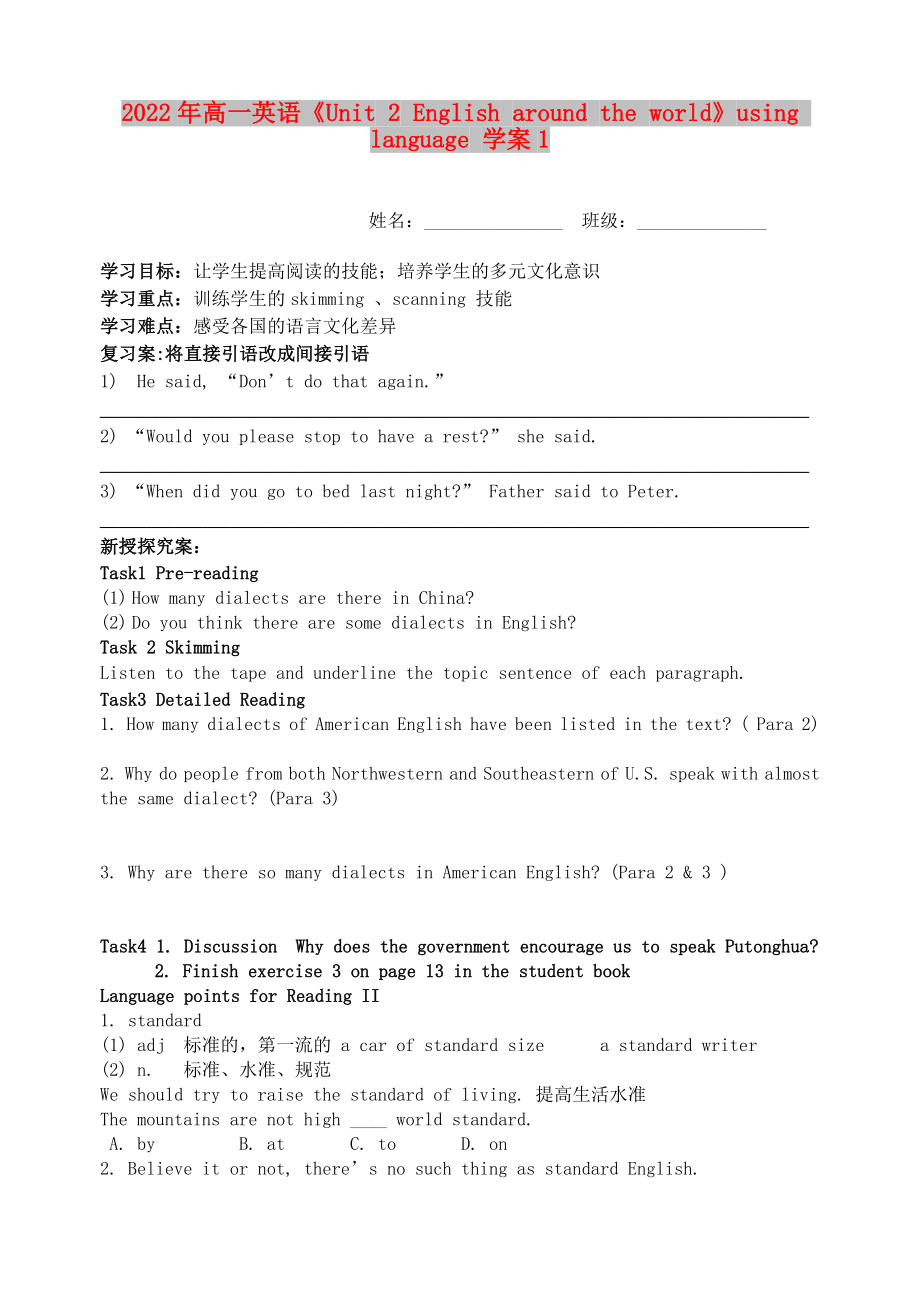《2022年高一英語(yǔ)《Unit 2 English around the world》using language 學(xué)案1》由會(huì)員分享�����,可在線閱讀�����,更多相關(guān)《2022年高一英語(yǔ)《Unit 2 English around the world》using language 學(xué)案1(3頁(yè)珍藏版)》請(qǐng)?jiān)谘b配圖網(wǎng)上搜索。
1�����、2022年高一英語(yǔ)《Unit 2 English around the world》using language 學(xué)案1
姓名:_______________ 班級(jí):______________
學(xué)習(xí)目標(biāo):讓學(xué)生提高閱讀的技能��;培養(yǎng)學(xué)生的多元文化意識(shí)
學(xué)習(xí)重點(diǎn):訓(xùn)練學(xué)生的skimming �����、scanning 技能
學(xué)習(xí)難點(diǎn):感受各國(guó)的語(yǔ)言文化差異
復(fù)習(xí)案:將直接引語(yǔ)改成間接引語(yǔ)
1) He said, “Don’t do that again.”
____________________________________________________________
2�����、________________
2) “Would you please stop to have a rest?” she said.
____________________________________________________________________________
3) “When did you go to bed last night?” Father said to Peter.
____________________________________________________________________________
新授探究案:
3����、Task1 Pre-reading
(1) How many dialects are there in China?
(2) Do you think there are some dialects in English?
Task 2 Skimming
Listen to the tape and underline the topic sentence of each paragraph.
Task3 Detailed Reading
1. How many dialects of American English have been listed in the te
4、xt? ( Para 2)
2. Why do people from both Northwestern and Southeastern of U.S. speak with almost the same dialect? (Para 3)
3. Why are there so many dialects in American English? (Para 2 & 3 )
Task4 1. Discussion Why does the government encourage us to speak Putonghua?
2. F
5���、inish exercise 3 on page 13 in the student book
Language points for Reading II
1. standard
(1) adj 標(biāo)準(zhǔn)的,第一流的 a car of standard size a standard writer
(2) n. 標(biāo)準(zhǔn)��、水準(zhǔn)�、規(guī)范
We should try to raise the standard of living. 提高生活水準(zhǔn)
The mountains are not high ____ world standard.
A. by
6����、 B. at C. to D. on
2. Believe it or not, there’s no such thing as standard English.
信不信由你,世界上沒(méi)有所謂的標(biāo)準(zhǔn)英語(yǔ)��。
believe it or not: 相當(dāng)于一個(gè)副詞�����,通常用于口語(yǔ)���,意為“信不信由你���,我說(shuō)的是真的”。
Believe it or not, she cheated in the exam.
no such thing as… 沒(méi)有…這回事
such…as…: 象…一樣的… 諸如…之類(lèi)的…
Such students as you
7�、 should have a bright future.
I don’t like such a person as Mary.
3. play a part in
(1)參加某活動(dòng).She plays an active part in local politics(當(dāng)?shù)卣?.
(2). 對(duì)某事有影響, 對(duì)某事起作用
She played an important part in the success of the plan.
Geography also plays a part in making dialects. 地理位置對(duì)方言的產(chǎn)生也有影響.
根據(jù)括號(hào)
8、內(nèi)的提示�,用play a part in的適當(dāng)形式完成句子。
a. My friend Jim is looking forward to _____________________ (扮演角色的機(jī)會(huì)) this series.
b. A good diet ______________________________(在幫助人們長(zhǎng)壽方面起著非常大的作用).
4. However, on TV and the radio you will hear differences in the way people speak. 然而, 甚至在電視上或收音機(jī)里都會(huì)聽(tīng)到人們?cè)谡f(shuō)話時(shí)的差異��。
t
9���、he way后面接定語(yǔ)從句時(shí), 關(guān)系代詞用that/in which或不用關(guān)系代詞���。
I did it in the way that/in which you taught me.
I don’t like ____ you speak to her.
A. the way B. the way in that
C. the way which D. the way of which
5.recognize (猜詞義)
I recognized my old friend at once. (
10�、 )
They recognized him to be a great leader.( )
We recognized that we had to overe a lot of difficulties.( )
You can recognize a tiger by its strips(條紋). ( )
vt. 辨認(rèn)出來(lái)�,承認(rèn),公認(rèn)
phrases: recognize one’s voice recognize sb to be ……be recognized to be……
11�、被承認(rèn)為…… recognize that……
注意:recognize是一個(gè)終止性動(dòng)詞。是指原來(lái)很熟悉�,經(jīng)過(guò)一段時(shí)間的間隔或別的原因后又重新認(rèn)出來(lái)。
6.expect : vt. 期望����,預(yù)料,認(rèn)為��,預(yù)期 expect sb to do sth指望/預(yù)料某人做某事
sb be expected to do sth expect to do sth 指望/希望做某事 expect +that-clause認(rèn)為/預(yù)想……I expect so. 我想是這樣�。I expect not. /I don’t expect so. 我想不是這樣。
當(dāng)堂檢測(cè)案:
根據(jù)下列各句句意
12��、及所給單詞的首字母或漢語(yǔ)提示����,寫(xiě)出所缺單詞的正確形式。
1. I’ve developed a taste for ______ (非洲的) music since my trip to Nigeria last year.
2. Jane has changed so much that I could hardly ________ (認(rèn)出) her at the party yesterday.
3. Located in ___________ (東南部的) Wales, Abergavenny is a relatively small city.
4. This bridge can bear the weight of the heaviest ______ (卡車(chē)).
5. Shall we take a _____ (出租車(chē)) there and e back by subway?
課后練習(xí)案:Read the passage “The Oxford English Dictionary” in the workbook and finish the exercise below the passage.
課后反思____________________________________________________________
 2022年高一英語(yǔ)《Unit 2 English around the world》using language 學(xué)案1
2022年高一英語(yǔ)《Unit 2 English around the world》using language 學(xué)案1

